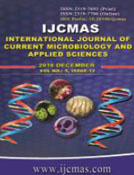


 National Academy of Agricultural Sciences (NAAS)
National Academy of Agricultural Sciences (NAAS)

|
PRINT ISSN : 2319-7692
Online ISSN : 2319-7706 Issues : 12 per year Publisher : Excellent Publishers Email : editorijcmas@gmail.com / submit@ijcmas.com Editor-in-chief: Dr.M.Prakash Index Copernicus ICV 2018: 95.39 NAAS RATING 2020: 5.38 |
Acne vulgaris is a multifactorial inflammatory skin disease and the inflammation play an important role in its pathogenesis, many pro-inflammatory adipokines and cytokines contribute to this pathogenesis, from these IL-8 and resist in which act as pro-inflammatory mediators and encoded by different genes. The present study was conducted to investigate whether RETN-420 C>G gene polymorphism as a predisposing factor to acne vulgaris. 49 Iraqi patients who were suffered from acne vulgaris have enrolled and compared with 25 healthy controls. RFLP-PCR technique was performed to detect the RETN-420 gene polymorphisms. The frequency ofthe genotypes in acne patients were (CC=6%, CG=14% and GG=80%), while in control group they were (8%, 24% and 68%) respectively. The frequency of all genotypes was not found any significant differences between acne patients and the healthy controls (P=0.53). No significant difference in genotype frequency regarding the gender between patients and the healthy group can be noted also between the same gender of patients and healthy group, as well as there was no association detected between this type of polymorphism and the degree of severity of acne (P value=0.74). We conclude that RETN-420G>C single nucleotide polymorphism do not contributewith the pathogenesis of acne vulgaris and there was no significant association between different alleles and the severity of the disease in two gender.
 |
 |
 |
 |
 |